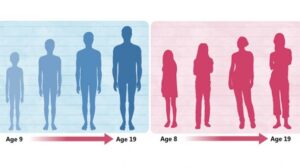
By Kathy Hubbard
Last week we took a look at the endocrine system, how it works, and how it can go wrong when hormones are not appropriately secreted. The result is an over or underproduction of hormones. If you missed the article, you could find it online at the archives of this newspaper; search the keyword “endocrine.”
To recap a bit, hormones are your body’s chemical messengers. “Produced in the endocrine glands, these powerful chemicals travel around your bloodstream, telling tissues and organs what to do. They help control many of your body’s major processes, including metabolism and reproduction,” Healthline.com says.
In children, hormones play an essential role in their development and overall health. Most disorders associated with hormonal imbalance are typically linked to abnormal growth or sexual development. Puberty occurs in boys between the ages of nine and fourteen and girls as early as eight and as late as thirteen.
Hypothalamus begins to produce a hormone (gonadotropin), causing the ovaries to produce estrogen in girls and the testes to produce testosterone in boys.
“The greatest gains in bone size and strength occur in adolescence when the hormones of puberty speed up bone growth. Bones not only get longer and wider, but they also get denser,” Hormone Health Network says.
Slow height growth, measured at less than two inches a year, maybe a sign of hormone deficiencies. However, a slowing in growth is typical right before puberty starts.
Delayed puberty is when a teen doesn’t go through puberty at a typical age. For girls, it may mean her breasts don’t develop by age thirteen or that she hasn’t started menstruating by her sixteenth birthday. For boys, it means no enlargement of the testicles by the time he’s fourteen.
Precocious puberty is the opposite. It’s when the appearance of testicular enlargement in boys and breast development in girls happens at a younger age (nine for boys, eight for girls). Precocious puberty affects about one to two percent of children in the U.S.
Premature adrenarche is when the development of pubic and armpit hair, acne, and adult body odors in both girls and boys happens earlier than expected. It’s assumed to be caused by an increased secretion of male hormones from the adrenal gland.
For the most part, none of these is a medical problem, but if you are concerned, talk with your pediatrician.
“Depending on the underlying condition causing your child’s early or late development, medication may or may not be needed,” HHS says. “For children undergoing early pubertal development, your doctor may discuss whether the use of medication to delay puberty would be needed.
“The rationale for the treatment of precocious puberty is based on two main considerations. Twenty percent of adult height is attained during puberty, and therefore untreated precocious puberty could result in stunted growth. Additionally, there may be psychological considerations for children maturing much faster than their peers.”
Typically children with delayed puberty, “late bloomers,” don’t need medical attention. However, if the delayed puberty is caused by an inability for the body to produce the necessary hormones, a hormone replacement regimen may be prescribed.
We learned last week that women produce estrogen, progesterone, and testosterone. If a girl has polycystic ovary syndrome (PCOS), her body is making too much testosterone. The signs and symptoms include irregular menstrual periods or none at all; periods that are very heavy or very light; unwanted hair growth; acne; thinner hair on the head; patches of dark, thickened skin on the neck, armpits or between the breasts, and weight problems. PCOS can cause infertility and metabolic problems and should be evaluated by a healthcare provider.
“Gender incongruence can also become noticeable during puberty,” Hormone Health Network says. “This is where one’s gender identity doesn’t match up with one’s body. For individuals with gender incongruence, experiencing pubertal body changes can contribute to emotional distress called gender dysphoria.”
Children with gender dysphoria may insist that they are a different gender from that assigned at birth. They may “prefer roles and play a different gender, and may develop discomfort about their body parts. If changes with puberty worsen distress, persistence into adulthood is likely.”
HHS says that if the child or parent is concerned about gender nonconformity, it might be advisable to consult with a mental health provider who has experience working with transgender or gender diverse children and adolescents.
Kathy Hubbard is a member of Bonner General Health Foundation Advisory Council. She can be reached at [email protected].

